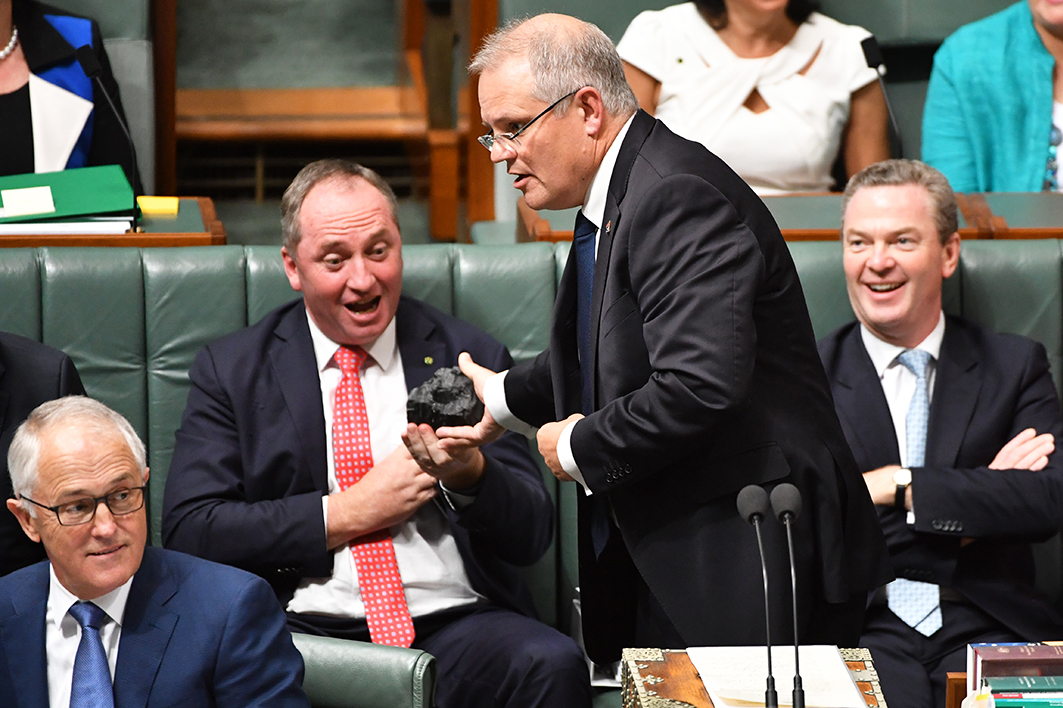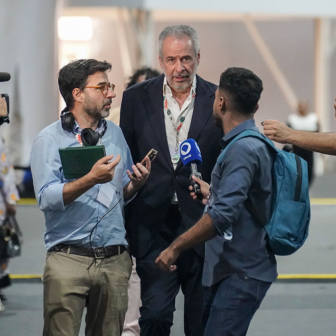“Australia is… making an outsized contribution to the global crisis we face, and our leaders are obstructive in international negotiations,” David Ritter, CEO of Greenpeace Australia Pacific, said in August. “Our country [is] increasingly seen as a rogue state on climate.”
Ritter argued that the Morrison government needed to come up with more ambitious climate change policies to avoid ruining Australia’s international reputation. His suggestion that in the eyes of outside observers Australia had gone “rogue” responded to Australians’ growing concerns about their country’s image overseas. It was also designed to generate maximum attention by scandalising his audience.
If Australia were indeed widely regarded as a rogue state, it would be in select but dubious company. Probably the first country that comes to mind when we hear the term “rogue state” is North Korea. It was the first Clinton administration that designated as rogue states those regimes that were considered to flout international rules and agreements, support terrorism, develop weapons of mass destruction and suppress human rights. At the time they also included Libya, Iraq, Iran and Cuba. Clinton’s Republican predecessors Ronald Reagan and George Bush senior had similarly singled out “renegade” or “outlaw” states that should live in fear of an American sheriff intent on restoring order.
Although the State Department temporarily dropped the designation “rogue state” in favour of “state of concern” in 2000, the idea remained that the behaviour of certain regimes justified the United States’ ostracising and punishing them. Punishment could mean imposing economic sanctions, as in the case of Iran. It could also involve military action by the United States, ostensibly on behalf of an international community.
When the Greenpeace CEO suggested that outside observers were regarding Australia as a rogue state, he may not have had the origins of that designation in mind. But he was probably aware of precedents for turning the term back on the very governments that had taken the moral high ground vis-à-vis the likes of Kim Il-sung, Saddam Hussein and Slobodan Milošević.
Perhaps the most famous example is William Blum’s book Rogue State: A Guide to the World’s Only Superpower, published in 2000, which describes the United States as a “Mecca of hypocrisy” that harbours terrorists, bankrolls human rights violators and pays little heed to international rules and norms. American hypocrisy has also inspired books by Noam Chomsky and Jacques Derrida. Similarly, two well-regarded economic journalists have argued that Switzerland ought to be regarded as a Schurkenstaat, or rogue state, for facilitating tax evasion on a global scale.
Even if Ritter didn’t think of the United States or Switzerland, he would have known that he wasn’t being particularly original when suggesting that Australia’s stance on climate change might qualify it for rogue state status. As early as 2002, in a paper delivered at the Melbourne Institute’s Economic and Social Outlook Conference, the Griffith University environmental scientist Ian Lowe referred to Australia as a rogue nation when arguing that the Howard government ought to ratify the Kyoto Protocol. Three years later, one of Ritter’s predecessors at the helm of Greenpeace Australia Pacific, Steve Shallhorn, said that “Australia is a rogue government when it comes to the Kyoto Protocol… because on that question they are outside the norm of industrialised countries.”
Australia did belatedly ratify the Kyoto Protocol — in 2007, after a Labor election win ended John Howard’s long reign. But when the Coalition government — and thus a Howard-era approach to climate change — returned in 2013, the charge that Australia was behaving like a rogue nation resurfaced. During 2013, for example, the Marshall Islands’ climate change minister Tony deBrum said Australia, Canada and Japan, which had argued against tougher measures at COP19 in Warsaw, were acting like rogues. Two years ago, Adam Bandt, the Greens member for Melbourne, told parliament, “Increasingly in Europe and many other countries, Australia is seen as a rogue state… drunk on our fossil fuels that we peddle to the rest of the world.”
But the federal government’s support for fossil fuels is not the only, and not even the main, reason why Australia has often been likened to a rogue nation. It is in relation to the government’s migration policy that the epithet “rogue state” has been most often applied.
Earlier this year, for example, Golriz Ghahraman, the foreign affairs spokesperson of the Greens in Aotearoa New Zealand, said Australia was an “outlier” and a “rogue nation” and should be referred to the United Nations. He was outraged after the deportation of a fifteen-year-old permanent resident of Australia.
In 2014, then Greens leader Christine Milne told the Senate that she was opposed to the Migration Amendment (Protection and other Measures) Bill because “it confirms what many other countries around the world are saying — that is, that Australia, as a state party in the United Nations, has gone rogue on human rights, on international law and torture.” That same year on Lateline, Alastair Nicholson, the former chief justice of the Family Court, likened the government’s plans to send asylum seekers to Cambodia to “behaving, I think, as a rogue nation.”
The same year, Greg Barns, a former chief of staff of Liberal Party politician and federal finance minister John Fahey, wrote in the Hobart Mercury that Australia “is the newest member of the infamous rogue state club” — both on account of the government’s asylum seeker policy and because of its response to global warming.
When Greg Barns, Christine Milne, Alastair Nicholson and David Ritter said that Australia might be considered a rogue nation or rogue state, they used the term in a loose sense, ignoring some of the specific attributes identified by US State Department officials in the 1990s. They were suggesting that Australia was acting outside internationally agreed rules and norms, and/or that its actions were jeopardising the wellbeing of other nations, if not imperilling the global commons.
Such accusations have been well founded. International lawyers, Australian and international human rights NGOs such as Amnesty International and Human Rights Watch, various UN rapporteurs and committees, the UN High Commissioner for Refugees and the UN High Commissioner for Human Rights have repeatedly and justifiably condemned Australia’s response to asylum seekers, including pushbacks, mandatory and potentially indefinite immigration detention, and the deportation of asylum seekers to former colonies. Here is not the place to revisit these arguments.
When it comes to climate change, Australia has long been one of the world’s prime greenhouse gas emitters on a per capita basis, as well as a leading exporter of fossil fuels. It has also long been a prominent naysayer at a succession of international meetings, and one of those slowing down progress on global action against climate change. Australian intransigence and recalcitrance were particularly evident at COP25 in Madrid, when the Australian delegation was reportedly instrumental in thwarting progress at the negotiating table.
Ritter had good reason to sound the alarm in August, a couple of months before the COP26 negotiations. The Australian government committed to a zero emissions target by 2050 but without revealing a roadmap to show how that target could be reached. And the government refused to revise its target for 2030, instead lauding the “Australian way,” which includes a “gas-fired recovery” and a continuation of coalmining “for decades to come.” It was not surprising that a survey by media monitoring company Meltwater Australia found Australia’s international reputation took a hit in the lead-up to COP26.
Nevertheless, Australia’s role was less controversial in Glasgow than it had been two years earlier in Madrid. That was because the Morrison government was but one of many that proved reluctant to agree to meaningful measures to slow down climate change. And because India took on the role of the principal villain, there was no need for Australia to be a prominent naysayer (it was nevertheless firmly in the camp of nations who showed little interest in substantial progress). Thus, those critical of Australia didn’t resort to calling Australia a “rogue nation,” but instead employed more moderate language, such as “laggard.”
But whether or not a negotiator is obstructing proceedings can also be a matter of perceptions. Unlike in Warsaw and Madrid, Australia tried to fly under the radar at COP26. Its delegation even agreed to a text asking governments to provide updated targets next year; only after the conference had concluded did the Morrison government admit that it had no intention of meeting this request.
The point made by Australian critics of government policy, as well as by Tony deBrum, Golriz Ghahraman and other outside observers, is not usually to argue that Australia meets any accepted criteria of a rogue nation. It is to suggest that others might well regard Australia’s behaviour as befitting that of a rogue nation. In other words, the critics have been talking about Australia’s reputation more so than its actions.
Whether or not Australia is considered a rogue nation on account of its climate change policies does matter. Here, the North Korean analogy is instructive. Because North Korea is considered to have gone rogue (by threatening to harm others rather than causing harm to people other than North Korean citizens), it has been punished with sanctions. There is no talk yet of imposing sanctions on Australia, but nations taking costly measures to slow down climate change don’t want nations that refuse to take such measures to gain an unfair advantage. The European Union, for one, will impose tariffs on products exported from countries, including Australia, that don’t do their fair share in tackling global warming.
Has Australia’s reputation been affected by its actions or policies? The answer would certainly be “yes” among those whose job it is to evaluate those actions and policies: international human rights and refugee law experts, and climate scientists.
But what about overseas publics, whose knowledge of Australia is largely mediated by journalists and other opinion-makers? Here, let me first debunk the myth that Australia’s reputation has only suffered in the past twenty years, in the wake of the Tampa affair and Australia’s refusal to sign the Kyoto Protocol.
Some of Australia’s Asian neighbours held highly unfavourable views of Australia during the 1950s and 1960s, well before the term “rogue state” was first officially used, because of the racist White Australia policy. Memories of that policy persisted long after it was officially abandoned in 1973. In the Philippines, for example, echoes of White Australia and the infamous Gamboa case of the late 1940s reverberated in 2005 when it was discovered that Vivian Alvarez Solon, an Australian citizen born in the Philippines, had been unlawfully deported from Australia four years earlier.
Immigration policy wasn’t the only problem. Australia attracted criticism in the United Nations in the 1960s because it held on to Papua New Guinea long after most British and French colonies in Africa and Asia had become independent, though such criticism did not extend much beyond the UN Trusteeship Council.
In Europe, concerns about Australia being an outlier, at least among First World democracies, initially arose over Indigenous rights issues in the 1990s, including the government’s native title legislation in the wake of the Wik judgement, the Howard government’s refusal to apologise to the stolen generations, and the disproportionate number of Indigenous people who died in custody.
These concerns related to the treatment of Australian citizens, in Australia, by Australian authorities. Those voicing them shared the belief that human rights violations are not just a matter for the country where they occur and that Australia’s conduct domestically represented a flouting of international human rights law, including treaties Australia had signed. The apology issued by the Rudd government did little to dampen these concerns, not least because it was accompanied by the Northern Territory intervention, carried over from the Howard government, and because endemic injustices remained.
While Australia’s international reputation was diminished among activists championing Indigenous rights causes, it took an issue affecting asylum seekers — that is, non-Australian citizens — both in and outside Australia further to tarnish the country’s reputation.
But it is Australia’s stance on climate change, especially since the 2019–20 bushfires, that has had the biggest impact on its image overseas. In 2020 Austrade published the Global Sentiment Monitor, the results of a survey about Australia’s reputation in five Asian countries, Britain and the United States. It found that Australia’s global reputation remains strong. Reading between the lines, though, it also suggests that there is much room for improvement:
To grow our reputation, we need to demonstrate the high quality of our products and services, our clean, green produce, effective climate policies, fair immigration policies, and positive contribution to global issues.
True, Australia’s self-perception as a model international citizen, on the one hand, and international perceptions of Australia, on the other, have often been at odds. And not everybody in Europe thinks first of reefs, beaches and the outback, or the Sydney Olympics, when Australia comes up in conversation. But let’s keep this in perspective. The evidence from the Global Sentiment Monitor and other surveys suggests that most people in East Asia, North America and Europe still associate Australia far more closely with an enviable lifestyle than with the poor life expectancy of Indigenous Australians, the incarceration of asylum seekers or the volume of coal shipped from the Port of Newcastle. Even New Zealanders, who tend to know more about their trans-Tasman neighbours than people in faraway Europe, would probably point to underarm bowling before mentioning the detention and deportation of fellow citizens.
Successive Australian governments, notoriously beholden to the fossil fuel industry, have argued that Australia’s share of greenhouse gas emissions is negligible. Of course, Australia isn’t on its own responsible for global warming. In fact, whether or not Australia becomes carbon-neutral doesn’t really matter in the global context. Other countries would be able to compensate if the Morrison government continued to drag its heels.
Given that global warming is indeed a global issue, Australian inaction would not even be decisive when it comes to the effects of that warming on the Australian continent. The risk of Australian bushfires does not only, or even mainly, increase because of Australian CO2 and methane emissions.
That is not to say, however, that a nation’s obligation to reduce emissions ought to depend on the size of its population. Rather, I’d suggest it should depend on its contribution to global warming historically, its emissions on a per capita basis, and its capacity to take effective measures to reduce emissions — and to assist others taking such measures.
Australia’s stance on climate change is arguably more extreme than that of other industrialised countries. Much like in the debate about the Global Compact for Safe, Orderly and Regular Migration, which the Morrison government refused to sign, Australia has been an outlier. It may be instructive to consider whether Australia’s approach, both in relation to irregularised migrants and in relation to climate change, amounts to “rogue” conduct. But the value of characterising Australia’s conduct as “rogue” for heuristic purposes ought to be decoupled from the question of whether it is productive to label Australia a “rogue nation” in public debates about climate change.
A focus on Australia’s “rogue” status is, I think, unhelpful both overseas and in Australian domestic public debate. In other industrialised countries, a focus on the Morrison government’s stance detracts from the fact that most governments are not effectively addressing climate change. In the global north, there is hardly a nation that has not gone rogue. Even where I currently live, in Germany, a country that likes to think of itself as an exemplary international citizen, none of the parties currently represented in federal parliament took policies to the 2021 election that, even if fully implemented, would allow Germany to meet the 2015 Paris agreement’s target of keeping global warming to below 1.5°C.
I’m all in favour of adopting climate change policies that don’t stop at the border, such as a ban on investments in fossil fuel industries, wherever they are, and additional import duties on products from countries that refuse to transform their economies to slow down global warming. But I also believe it is more appropriate to demand action where I live, in my neighbourhood and in my city, rather than in faraway countries. That action could well have an impact in faraway countries — if, for example, it involves lobbying a German company to withdraw from a coalmining venture outside Germany (as happened, albeit unsuccessfully, in early 2020 when Siemens was put under enormous pressure to withdraw from the Adani project in Queensland).
But people overseas may not need much convincing that they should focus their attention on what’s close to home. In fact, as far as I can tell, the overwhelming majority of references to Australia’s being considered a rogue nation have originated in Australia. My sense is that Europeans, for example, tend to be puzzled, rather than outraged, by Australia’s response to asylum seekers and by its stance on climate change.
Australians often overestimate the critical attention their country attracts. That has been the case in relation to asylum seeker policies: both the government and refugee advocates exaggerated how much these policies repulsed, or appealed to, publics overseas, particularly in Europe, and the extent to which other countries were prepared to emulate them.
Such overestimation could also be the result of a misconception about the originality of Australia’s rogue behaviour. Australia is not the only country that has ignored calls by scientists to reduce greenhouse gas emissions. Canada under prime minister Jean Chrétien, for example, was singled out as a “rogue state” on climate before that term first appeared in the Australian discussion. And of course Australia didn’t invent the extraterritorial processing and detention of asylum seekers; they were already practised in the 1980s by the United States in the Caribbean.
The claim that others might regard Australia as a rogue nation could be intended to prompt the government to change tack lest the nation’s reputation be tarnished. If that’s the case, I don’t think it will work. Some Australian governments have prided themselves on snubbing their international partners, and Morrison and his crew may fall into that category; they might simply consider the information that their actions upset some people overseas a feather in their cap. Most Australian governments, however, have paid close attention to how Australia has been perceived overseas, and don’t need reminding by members of the public. It was not least such international attention that contributed to the demise of the White Australia policy, well before it became a major issue domestically.
If references to Australia’s poor reputation overseas are at all useful, then that’s because they may temper Australians’ view that their government’s approach to international relations is informed by a commitment to human rights, humanitarianism and the rule of (international) law. No, Australia is not a model international citizen, and could do well with the occasional reminder that self-perceptions can be deceptive.
In Australia, statements such as Christine Milne’s and Adam Bandt’s appeal to the audience’s nationalism (which sometimes manifests as a reverse pride in the nation’s flaws). Such an appeal is questionable for two reasons: first, because it could also work the other way, as the Howard government’s popular bashing of international organisations showed; and second, and more important, because a focus on the national interest is at the heart of the predicament that we are currently facing.
This has also been true in the debate about asylum seekers: rather than referring to Australia’s reputation, or to economic losses or gains for Australia, that debate ought to focus on Australia’s capacity to assist people in need of a new home, its responsibility as a regional power, its legal obligations as a member of the international community and, not least, the precarious circumstances of the men, women and children who are seeking Australia’s protection.
Similarly, rather than focusing on Australia’s reputation or the economic gains involved in a transformation of the Australian economy, we may instead want to foreground arguments that explain why such measures are desirable: because all countries need to deal with climate change to the best of their ability, and because Australia has specific obligations as a wealthy industrialised country that produces a comparatively large amount of greenhouse gases on a per capita basis and has also done so in the past. •
This is the extended version of a talk delivered on 22 November at a symposium to celebrate the fiftieth anniversary of the Academy of the Social Sciences in Australia.




